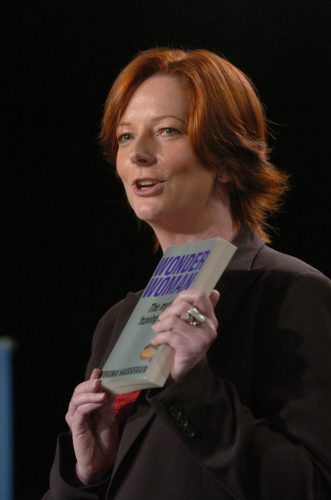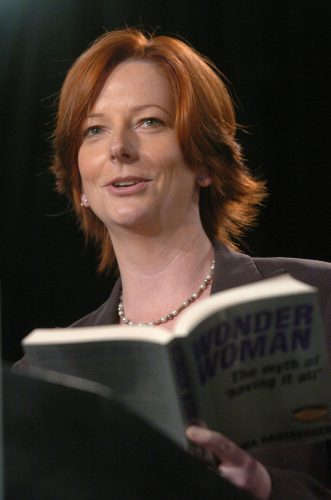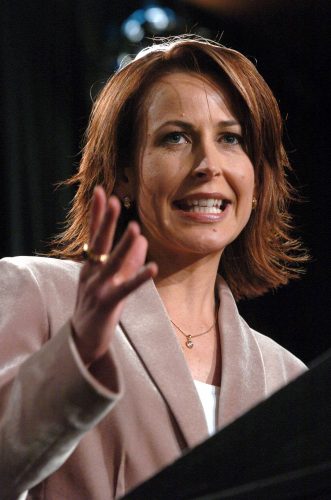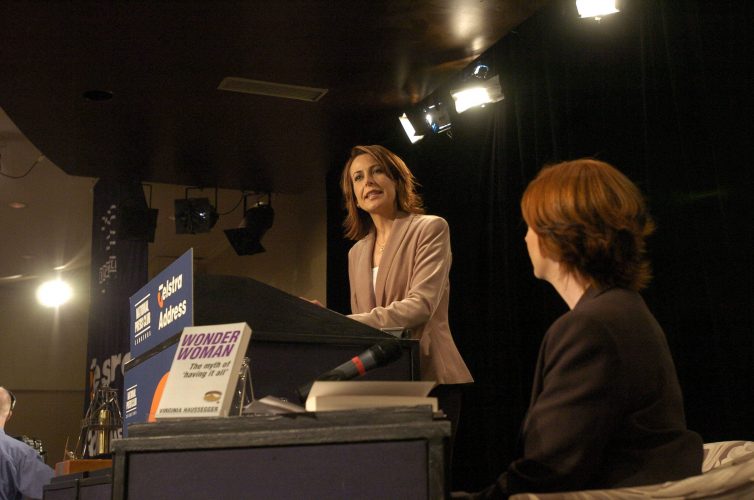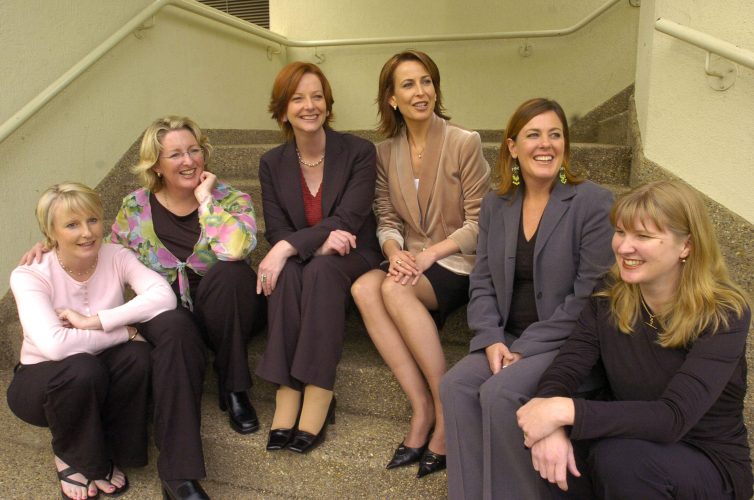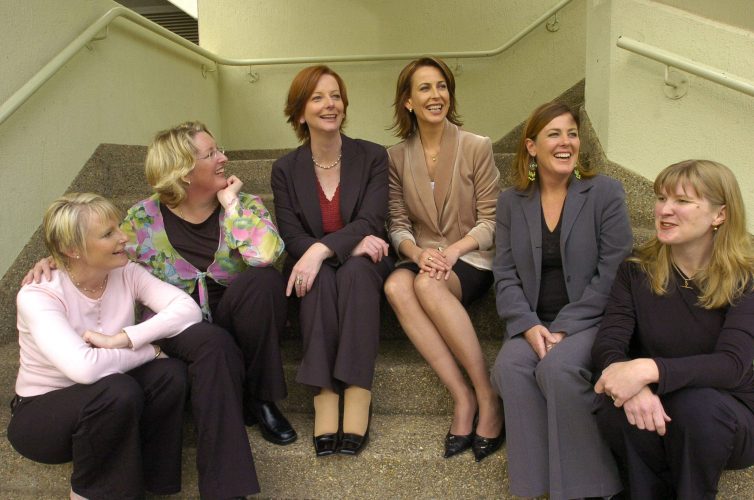So they’re back! The famous five are strutting the world stage again. But now the needle stick heels are higher, the breasts are larger, Posh’s face is tighter, Ginger’s outfit is frumpier, and the Girl Power message is, well – whatever.
But who cares? Just bring it on. Because as Baby Spice told us this week, girls just ”want to have fun”.
In case you missed it, the famous five have announced that six years after their ”official” split, they’re getting back together for one last hurrah. A quick whiz round the world tour with 11 pit stops: just enough for Posh, Ginger, Scary, Sporty and Baby to pocket 10million ($A23.5million) each. And less than seven days after the big announcement, one million groupies have already registered for the ticket lottery. (Assuming stampedes for standing space, the concert organisers have ditched outright ticket sales. Instead Spicette Wannabes have to throw their names into a hat, and pray they get lucky).
Spice Girls fans were heartbroken when the band splintered in acrimony in 1998, when Geri Halliwell – alias Ginger – had a big row with Victoria Beckham alias – pouty Posh. But the group limped on – minus one – for a few years more, and the loyal fans hung in there.
Now, according to the girls, this December’s return tour is a way ”to say thank you to our fans”. And if you believe that, you must have believed all the other Girl Power marketing spin the Spice Girls once spat.
And spit they did, because they had no idea what they were actually talking about. There is no denying the Spice Girls were a phenomenal hit. Not only did they comprise the most successful girl band ever – with 55 million records sold worldwide – but they were attributed with spearheading a seismic cultural shift that changed the lives of girls and young women forever. In short, the Spice Girls have been credited with introducing the world to Girl Power: a social movement with a manifesto of empowerment that encouraged ”ambition, assertiveness and individualism” in girls.
From the beginning Girl Power was the Spice Girls slogan and their mantra. It was as if they single- handedly gave life to the notion of female empowerment through their ownership of Girl Power.
But they didn’t own it – or invent it. They simply hijacked it. Spun it, twisted it, sexed it up and sucked it for every penny it was worth.
Now upon their return, I’ve no doubt they’re about to do it again. And that’s a worry, because what came out of their spicy mouths about women, power and oppression was always, as the British might say, shite.
Take this pearler from Baby Spice in 1997, ”Just because you’ve got a short skirt on and a pair of tits, you can still say what you want to say. We’re still very strong.” Not to mention – deep. Or this from Ginger, ” I didn’t really know much about history, but I knew about the Suffragettes. They fought. It wasn’t that long ago. They died to get a vote. The women’s vote. You remember that and you think, fing hell.” In a gooey TV moment when the Spice Girls announced their adoration of Margaret Thatcher, they declared she was ”the original Spice Girl”, elevating the Iron Lady to a kind of goddess of Girl Power.
The fact is, the Spice Girls were a fabulous marketing invention. The fab five had never heard of each other when they answered a newspaper advertisement calling for singers and dancers for a new girl band. They were auditioned, chosen and trained. Each was given a ”character” to play and an image to go with it, along with a carefully constructed costume wardrobe. With each girl playing out an archetype – Posh, Ginger, Scary, Sporty and Baby – the brilliant creators of the band had every type of girl and her fantasies covered. But just as the band and the characters were manufactured, so too was the Spice Girls brand of Girl Power.
Around the early ’90s, and some years before the band was born, feminism was already filtering through to young women in a third wave via pop culture; particularly music. The idea of the emancipation of young women and girls was beginning to take hold. As Germaine Greer pointed out, feminists soon saw the potential in the word ”girl” being used aggressively. The misogynist connotation of ”girl” or ”girly” implying weakness and inferiority was flipped on its head.
A grassroots movement of Girl Power began to market badges and posters announcing that ”girls can do anything” and ”it’s really good being a girl”. From that grew publications and online magazines like ”Geekgirl” and ”Riot Grrrl”. According to the latter, it was ”a movement supposedly about girl support and girl love”.
But by the time the Spice Girls and their hordes of corporate marketers got to it, the overt lesbian love bit was excised from Girl Power. Instead the notion was reconstructed, with a mass market in mind.
The original Girl Power spin offs, particularly the phenomenally successful Buffy the Vampire Slayer TV series had unearthed a massive new demographic – the girl. The commercial potential for this market was enormous – and beckoning.
Enter the Spice Girls. Suddenly feminism was skewered, repackaged and resold as being all about ”having fun”. ”Would you say you’re a feminist?” Posh was asked. ”No I wouldn’t,” she said, ”I like a man who opens doors for me and buys me flowers.” (Attagirl Posh! Forget the lusty illicit affairs. As long as he brings home flowers).
The trouble with the Spice Girls spin on Girl Power is that it was less about empowerment and more about exploitation.
The fact that the pre-teens who jived to Wannabe 10 years ago, are now fixated on a daily diet of bad girl celebrities – including Britney, Lindsay and Paris – as well as shagging and shopping, says nothing about the liberation of women from the pressures of commercial conformity.
Instead, in the words of the Spice Girls biggest hit, it says a lot about ”what I want, what I want, what I really, really want”.
